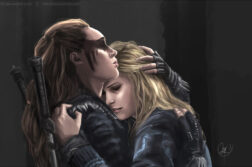TODAY’S digital technologies have created possibilities for whole new worlds of immersion and experience, and with them a panoply of subcultures organized around these sites. Under the rubric of “Fantasy Lands,” let us visit a few of these milieux with relevance to LGBT life and culture.
This is somewhat new territory for this magazine, which is usually concerned with historical themes and the arts, and it’s worth noting that all four theme articles were written by first-time contributors. I suspect all four are on the younger side, as things like LGBT comic books and video games and fanfiction are of relatively recent origin and may or may not be familiar to readers of a hard-copy magazine such as The G&LR (notwithstanding our digital edition).
One could argue that all mythological systems are operating in the realm of fantasy. What cyber technologies allow is an immersion in these manufactured spaces and the ability to participate in the action. The clearest example of this dynamic can be found in online video games, which allow the user to become a character in the story with powers and attributes that may bear little resemblance to real life. Ashton Corsetti argues here that romantic video games, which are all about finding true love, allow users to try on alternate genders and sexual orientations and to explore new possibilities that may become a rehearsal for real life.
An on-line genre for writers is that of fanfiction, which starts with a well-known fictional universe, such as that of Harry Potter, and allows writers to adopt a persona and write this character into a storyline in concert with the other users. While the sky’s the limit on sexual and gender possibilities, Hannah Matthews laments that most people have a stubborn habit of settling into stereotypical patterns of gay and lesbian roles and relationships.
The popularity of superhero comics obviously predates the Internet, but the arrival of comics online has turned the superheroes into superstars whose antics and orientations are richly discussed. Andrew White offers a brief history of LGBT superheroes in DC Comics and the explosion in their number in recent years. After all, the creators of comics are always looking for novel angles and abilities, and it’s heartening to know that being gay can sometimes be a superpower in its own right.
Finally, Grindr and Scruff are apps with which readers of this magazine may be more familiar. While they’re undoubtedly popular with gay men (mostly) of all ages, Aislin Neufeldt reminds us that there’s a decided bias toward youthful users on both apps (especially Grindr). To call them “fantasy lands” may be a stretch, but not much of one. Neufeldt focuses on the rural Midwest, where users talk a lot about “honesty” and “being real,” but that might be the biggest fantasy of all in these highly managed and manicured environments.



